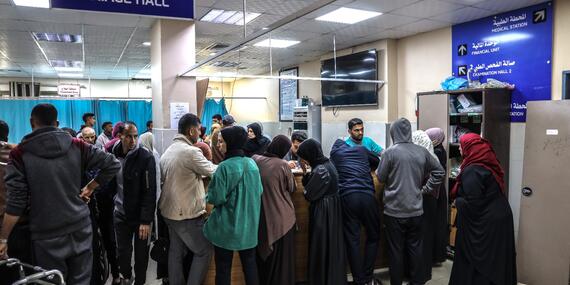Today's top news: Occupied Palestinian Territory, Ukraine, South Sudan

Israel/Occupied Palestinian Territory
UN officials have been marking 100 days since the horrific 7 October Hamas attack on Israel and subsequent bombardment of Gaza.
Under-Secretary-General (USG) for Humanitarian Affairs and the Emergency Relief Coordinator (ERC) Martin Griffiths said what has been unfolding in Israel and the Occupied Palestinian Territory is a war conducted with almost no regard for the impact on civilians -- describing the situation in Gaza as horrific, as relentless Israeli military operations continue.
Mr. Griffiths also noted that the families of the hostages have been waiting for the release of their loved ones for nearly 100 days, or at least for some information about their well-being. Unfortunately, he said, since November, no hostages have been released and no information has been shared with their families and loved ones. He reiterated his call for the humane treatment and immediate release of all hostages.
Philippe Lazzarini, the Commissioner-General of the UN Relief and Works Agency for Palestine Refugees in the Near East (UNRWA) visited Gaza yesterday. In a statement, he said that the past 100 days had seen the largest displacement of the Palestinian people since 1948. Overcrowded and unsanitary UNRWA shelters have now become “home” to more than 1.4 million people, he added, where they lack everything, from food to hygiene to privacy.
Meanwhile, the heads of the World Food Programme, UNICEF and the World Health Organization today said that getting enough supplies into and across Gaza now depends on more trucks being allowed through border checks each day; fewer restrictions on the movement of humanitarian workers; guarantees of safety for people accessing and distributing aid; and the opening of new entry routes.
The agency heads said it is critical that Israeli authorities allow aid agencies to use border crossing points into northern Gaza, as well as a working port close to the Gaza Strip. Access to Ashdod port would enable significantly larger quantities of aid to be shipped in and then trucked directly to the badly affected northern regions of Gaza, which few convoys have managed to reach.
Ukraine
The UN and our partners appealed earlier today at an event in Geneva for a combined $4.2 billion this year to support war-affected communities in Ukraine, Ukrainian refugees and their host communities in the region.
We need US$3.1 billion to help 8.5 million people inside the country and $1.1 billion to support 2.3 million refugees and host communities.
Nearly two years since the war’s rapid escalation, 14.6 million people need humanitarian aid in Ukraine – that’s 40 per cent of the population. Some 6.3 million people have fled the country and remain refugees, mostly in Europe.
USG Griffiths, stressed the profound impact of the war on children, asserting that this alone should compel a collective effort to significantly increase humanitarian assistance to Ukraine. He emphasized that, as the war continues unabated, the very fabric of Ukraine society is under attack with devastating consequences.
The UN High Commissioner for Refugees, Filippo Grandi, said that although the plight of millions of Ukrainian refugees is no longer in the headlines, they still need urgent support. He added that host countries continue to extend protection and include them in society, but many vulnerable refugees still need help.
Meanwhile attacks continue across the country. Yesterday alone, more than 40 homes, several education facilities and other civilian infrastructure were reportedly damaged, and several civilians injured in the front-line of the Donetsk and Kherson Regions, according to the national authorities.
The recent wave of attacks underscores the devastating civilian cost of the war, with winter ratcheting up the urgent need for life-saving humanitarian aid.
South Sudan
ERC Griffiths has allocated $10 million from the Central Emergency Response Fund to support people from Sudan fleeing to South Sudan.
As of today, about half a million people have crossed into South Sudan since mid-April, when Sudan’s war started.
In just the past month, more than 60,000 people have arrived in South Sudan, following the outbreak of clashes in and around Wad Medani, Sudan’s second-largest city. Thousands more people may arrive in South Sudan over the next six months.
The funds will be used to build shelters, offer cash assistance, build water, sanitation and hygiene facilities, and support onward transportation for new arrivals who are currently staying at overcrowded transit sites.
